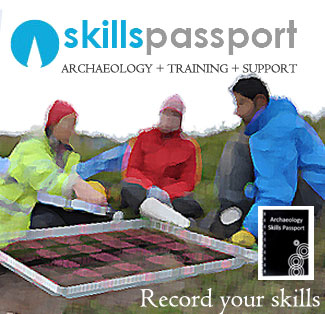
Research into self-assessment was carried out as part of the Inclusive Accessible Archaeology project, which resulted in the development of a self assessment tool kit (Embleton et al 2006).
Prior to undertaking fieldwork students gauged their potential to undertake various archaeological tasks based on a self evaluation of their own abilities. Following fieldwork the student then assessed their actual performance and undertook a new evaluation of their skills and abilities. As well as covering a wide range of archaeological tasks the tool kit also included transferable skills such as analytical ability and decision making.
The Skills Passport will build on these previous studies to enable all new practitioners of archaeological skills to both record their proficiencies within a formalised context but also allow for career pathway analysis, to access what skills are required for specific occupational strands. In addition the passport will allow for a Continual Professional Development (CPD) log to be easily maintained and used as supporting evidence for both employment opportunities and professional accreditation.
Examples of undergraduate training and assessment in field skills Bournemouth University (taken from Darvill 2006).
Students take part in department run field schools during the summers of their first and second years.
Assessment takes two forms. First, a fieldwork passport in which tasks are signed off by field school staff once they had been completed satisfactorily and an overall mark is given once the field school has been completed. Second, a field school log book in which students discuss the results of the work they carried out within the wider archaeological context. This is undertaken both during the field school and in the following term.
Liverpool University (information supplied by university staff)
All students attend a departmental fieldwork project.
Students are assessed by the project director who comments on their performance, successful completion of tasks, enthusiasm etc. Students taking a voluntary module in Archaeological Excavation Skills have to produce a site diary (an account of the work they undertook) and a site report and are also assessed on a range of field tasks by the director of the fieldwork project they attend.
University of Sheffield (information supplied by university staff)
Students take part in excavations run by department staff.
Sheffield has only just introduced assessment of fieldwork training. Students keep a diary during their excavation and present a portfolio in the first semester of their second year, which includes evidence of the field skills that they learnt (section drawings, plans etc.). This is assessed and forms part of a core Research Skills module.
University of York (information supplied by university staff)
All first year students attend the departmental field school, which is tied into pre and post excavation training, field trips and a lecture series. Its worth noting that York feel that the field school and related courses contribute to high student applications.
Students complete a fieldwork diary where they record the activities that they carry out. In previous years they also wrote a report on the excavations but this year they will take a test where that covers the skills that they have learnt (such as drawing a matrix from a section, interpreting a site drawing or explaining how to lay out a grid).
This summer they are assessing their practical teaching (including means of assessment) through funding from the HEA.
Institute of Archaeology, UCL (information supplied by university staff)
All first years students spend two weeks on the departments training excavation, which is run by the IoAs field unit (Archaeology southeast). They then have to do a further 10 weeks compulsory fieldwork on excavations of their choice.
Assessment is by a log book/fieldwork diary that the students fill in during the excavations and complete in the following term. This includes site plans, sections etc that the student produced as well as a discussion of the results of the excavation set in its wider archaeological context.
University of Durham (information supplied by university staff)
All students attend approved fieldwork projects in their first and second year
The first year fieldwork is assessed as part of a second year module where the students have to discuss their fieldwork experience and include material that they produced on site (such as section drawings). The fieldwork itself is not assessed as part of the student’s degree but they given feedback after each season.
Bibliography
Darvill, T. 2006 Linking fieldwork, theory, and knowledge in teaching prehistoric archaeology. In: Research in Archaeological Education Journal. Vol 1:2. Prehistoric Pedagogies? Approaches to teaching European prehistoric archaeology. Proceedings from the European Association of Archaeologists Conference, Krakow, 2006.
Embleton, J., Philips, T., Scoullier, S., Gillham, S. & Gilchrist, R. 2006. A characterisation of archaeological field techniques: Assessed by physical and cognitive demands. http://www.britarch.ac.uk/accessible/documents.php

